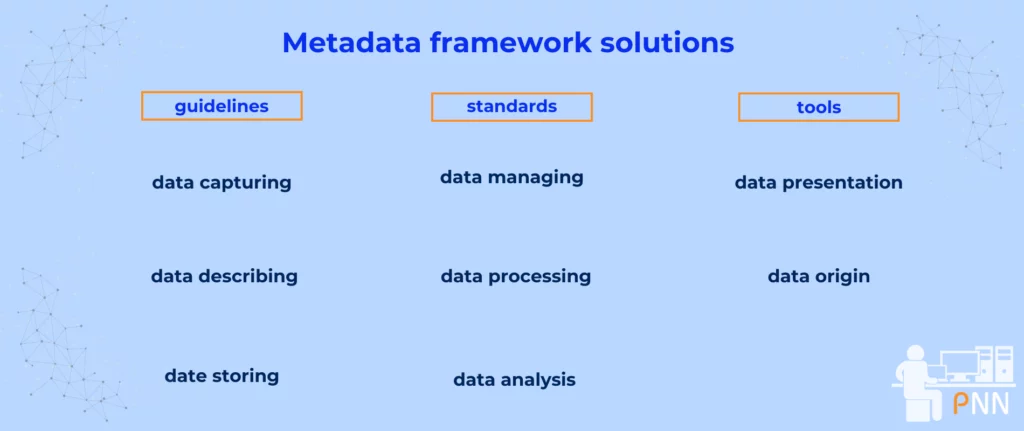What Is a Metadata Framework?

In the ever-evolving landscape of information technology, the significance of efficient data management cannot be overstated. One crucial aspect of this management is metadata, and at the core of handling metadata effectively lies the management framework. In this article, we will delve into the depths of this framework, exploring its definition, application, advantages, and the essential building blocks that make it an indispensable tool in the world of data governance.
Before we describe all the features of the metadata framework definition, let’s establish a clear understanding of what this term entails. Metadata, simply put, refers to data about data. It provides valuable context and information about various facets of data, such as its origin, format, and relationships with other pieces of information.
A metadata framework is not necessarily a proprietary platform, but rather a framework or system for structured management and organization of metadata within the platform or system. However, as a platform, the framework usually covers a broader set of functionality and serves as a comprehensive solution to the problems associated with the ever-increasing volume and complexity of data in today’s digital landscape. It provides a standardized methodology for collecting, storing, and utilizing metadata, thereby enhancing the overall efficiency of data management processes.

The utilization of a metadata management platform is pivotal in harnessing the full potential of a metadata framework. This platform acts as a centralized hub where metadata from various sources can be ingested, catalogued, and made accessible to relevant stakeholders. It offers a user-friendly interface, enabling users to search, analyse, and leverage metadata to make informed decisions.
Moreover, these platforms often come equipped with tools for data lineage tracking, ensuring transparency in understanding how data moves through an organization. This not only aids in compliance efforts but also facilitates better decision-making by providing a clear picture of data dependencies and relationships.
The adoption of a robust metadata framework brings forth a plethora of advantages for organizations that have to navigate the intricate data landscape. One key advantage is improved data discoverability. By having a well-organized metadata repository, users can easily locate and access the relevant data they need, reducing the time spent on searching and increasing overall productivity.
Another significant benefit is enhanced data governance. A metadata framework establishes a standardized approach to data management, promoting consistency and accuracy across the organization. This, in turn, mitigates the risks associated with data quality issues, regulatory compliance, and security concerns.
Understanding the key components of a metadata framework is essential for its successful implementation. The primary building blocks include:
The versatility of a metadata management framework extends across various domains and industries. From finance to healthcare, and from manufacturing to technology, organizations across the board can benefit from its application. It plays a crucial role in:
Implementing a metadata management framework requires a strategic approach. The process includes:
The importance of a metadata management system can be gauged by its role in fostering data-driven decision-making. As organizations amass vast amounts of data, the ability to harness this data for strategic insights becomes a competitive advantage. A metadata management system lays the foundation for this by providing the necessary context and structure to make data not just a resource but a valuable asset.
What is metadata in .Net framework? In context .NET Framework term “metadata” refers to information describing the types and elements defined in your code. This information is of key importance in the process of compiling and executing code in the common intermediate language (CIL) in the .NET environment.
In conclusion, it should be noted that the metadata management process is not only a technological tool, but also a strategic necessity for organizations. Its ability to organize information in a data environment, improve detection capabilities and ensure effective management makes it an invaluable tool in the arsenal of modern business. Today, the role of metadata in structuring future information management cannot be overestimated. Take advantage of the potential of metadata and build a path to a more efficient and informed approach to data management.